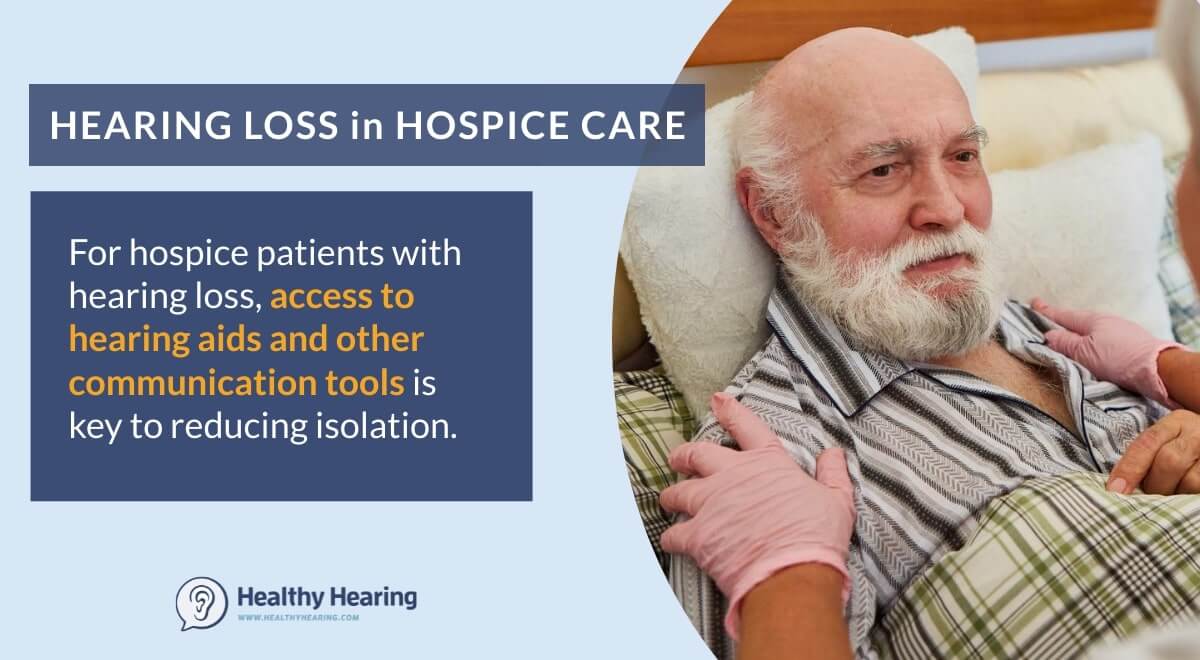Knowing your loved one is near the end of life and can't hear other people is a distressing thought. Unfortunately, hospice patients with hearing loss are sometimes in this predicament.
However, there are steps you can take to reduce the burden of hearing loss on your loved one. In doing so, you help reduce their isolation and improve their ability to communicate with those around them. Most importantly:
- If your loved one wears hearing aids or other devices, make sure they have their hearing aids with them, and they are kept clean and charged. Near the end of life, your loved one may need help wearing them and keeping them in a safe location when not in use.
- If your loved one has hearing loss, but does not own or wear hearing aids, be sure to let hospice staff know so they can adjust how they communicate. Assistive listening devices may be helpful, such as caption apps that turn spoken speech into text.

Other communication tips for hospice care
- Ensure you have the patient's attention prior to speaking.
- If possible, position yourself at eye level with the patient when speaking.
- Speak clearly, but do not shout.
- Have the patient wear their glasses so they can see you speak.
- Reduce or eliminate distracting background noises before speaking.
- Ask if the patient has heard and understood what was said. If you're not sure, you can ask them to repeat it back.
- Keep a dry erase board or a pen and pad at the patient’s bedside to augment communications.
- People in the end stages of life, especially those with hearing loss, can find certain sounds, such as a blaring television, irritating. Make sure to ask about their preferences with respect to noise levels.
- Keep in mind that hearing loss can sometimes be mistaken for dementia. And in patients with known dementia, hearing loss makes it even harder to complicate.
Some people at the end stage of life–especially those with hearing loss—can find certain sounds, such as a blaring television, irritating. Make sure to communicate with them regarding their wishes with respect to noise level.
Hearing loss is common in hospice patients
While hearing loss can happen at any age, it's common in older adults. Additionally, cancer patients can lose hearing due to certain types of chemotherapy. Other ototoxic medications used for end-of-life care can affect hearing and balance as well.
The issue isn't lost on hospice staff, either. A national survey of hospice and palliative care providers found that 91% of respondents believed that hearing loss impacts the quality of care for older adults. An additional 88% said that they recalled a situation where hearing loss made it harder to communicate with a patient.
Providing comfort is priority
The main goal of hospice care is to provide comfort to patients. Communication is an essential part of this. A patient needs to have a good understanding of the medical care being provided, especially pain management options.
This is not only for safety reasons but also for them to feel a sense of control over their final stages of life. Hearing is one of the last senses a person loses before death, according to the Hospice Foundation of America.
Clear communication with caregivers and loved ones fosters connection, easing the loneliness of a patient's final days. It empowers them, nurturing emotional well-being and a sense of autonomy.
“Hospice care is based on [the patient’s] need and comfort,” said Deb Athans, a grief counselor at Hospice of Cincinnati. “When you can’t communicate effectively, that is what is sacrificed.”
“Hospice care is based on (the patient’s) need and comfort. When you can’t communicate effectively, that is what is sacrificed.”
Have those important last conversations
Hospice patients with hearing loss don't need to feel lonely and isolated. Hearing aids and other treatments allow them to participate in decisions regarding their final days and connect with their family and loved ones.
Proper hearing care can enable those with hearing loss to be active participants in their own lives for as long as possible. Most importantly, no longer will hearing loss cause things to be left unsaid or unspoken between family members and their loved ones.
“It is so important to have those last conversations with family,” Athans said.
The above is the interpretation of Supporting Hearing Loss in Hospice and End-of-Life Care provided by Chinese hearing aid supplier Shenrui Medical. Link https://www.srmcm.com/Blog/Supporting_Hearing_Loss_in_Hospice_and_End-of-Life_Care.html of this article is welcome to share and forward. For more hearing aid related information, please visit Blog or take a look at our Hearing aids products















